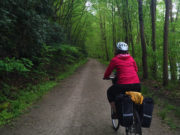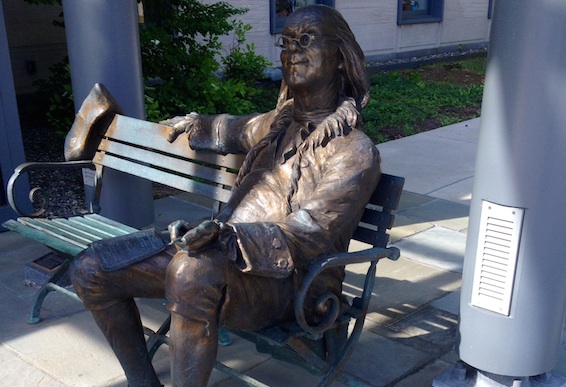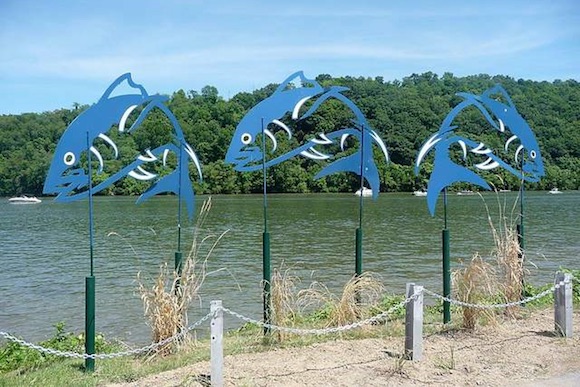In November 2015, Non-Profit Quarterly asked the question, “Are Small Towns the Next Art Districts?” One rural town in western Pennsylvania hopes the answer to that question is a definitive, “Yes.”
Artists and musicians are often a neighborhood’s “early adapters.” Drawn by low rents, they move into neglected urban areas and open galleries and cafes. Patrons, tourists and affluent new residents follow. Previously empty streets bustle with commerce; overlooked areas become “cool.” Great for everyone, except of course the artists and other longtime residents who can no longer afford the rents. What’s an artist to do?
Well, they’re adapting again. Some creatives are even turning to rural towns. These municipalities often have historic spaces ready to be repurposed as studios, apartments, galleries and musical venues at costs lower than in metropolitan areas. There is also an incentive for these communities to lure artists: The towns get an infusion of energy and a more dynamic economy. The ideal result is a “brain gain” of new ideas and optimism, counteracting the “brain drain” these towns have suffered for decades as younger people move away. Once the artists arrive, they also help a region attract residents and visitors who value cultural amenities.

One such town is Greensboro, Pennsylvania, located on 124 acres along the Monongahela River in southern Greene County. Dubbed “Delight” by the Mingo Indians because of its rich soil, Greensboro once boasted a thriving pottery industry. These days, the town has only a smattering of businesses, most notably the popular Captain’s Watch Inn. But it also has beautiful natural landscapes, a preserved historic district listed on the National Register of Historic Properties, a boat launch providing access to the river, lovely hiking trails, and a weekly summer Farmers’ Market. In addition, it’s home to some visionary residents, including Mayor Keith McManus, himself an accomplished artist and musician.
In Greensboro, there is a real sense of community. The artists and musicians teach each other and are really generous with their craft.Mitch Hall, sculptor & musician
After working for 10 years as a professor at nearby West Virginia University, McManus was disheartened to learn that only two percent of his art students were making a living in the field after graduation.
“They lose the space to create and the contact with other artists,” he explains.
His goal is to give that spirit of connection back to young people here in Greensboro so they can work together and support themselves through art and music.
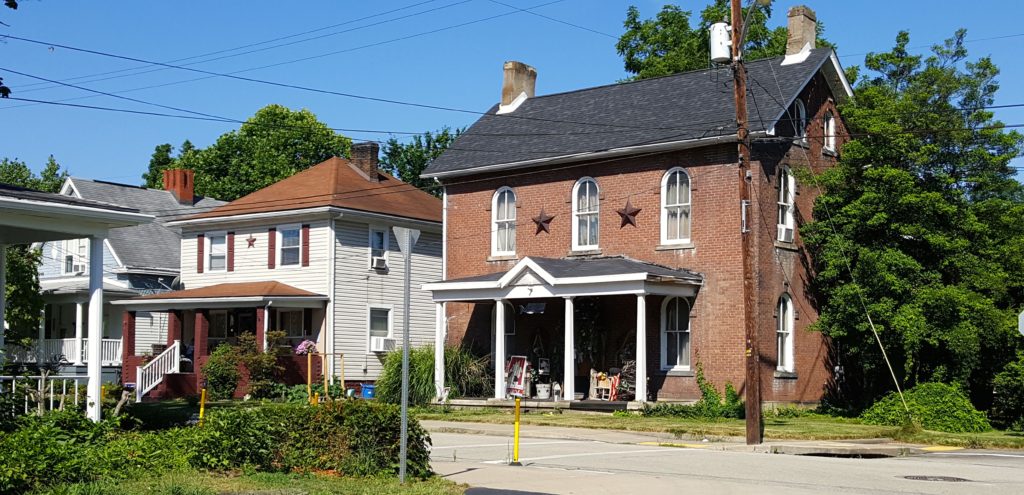
Six years ago, McManus bought the old Davis Theatre on Greensboro’s main street along with a deserted restaurant and recently closed book store. As a member of the River Town Program, Greensboro was able to obtain a grant to restore the theater’s facade.
Meanwhile, work continues on the interior. The building has stood empty since the 1950s, and during renovations McManus uncovered a stamped tin ceiling and a hidden loft in the soon-to-be artist cooperative. Apartments are under construction on the second floor. Other plans include a woodworking shop and bike shop on the first floor, a pottery studio in the back, artist studios in the loft, and room for a gallery in the front.
McManus currently lives in the old restaurant which he also uses as a studio. He hopes to find someone to run it as a viable eatery and venue showcasing local musicians like his own bands Stewed Mulligan — with whom he has played for 40 years — and the Red Turtle String Snappers. He envisions the bookstore as a coffee and smoothie shop; the space currently houses his eclectic collection of instruments and antiques. Most are for sale. McManus and other local musicians offer guitar, fiddle, banjo and voice lessons there.

Through the nonprofit Greensboro Arts Cooperative, McManus is on the lookout for other artists, craftspeople and musicians to assist with the rehabilitation. Thanks to his son Shane and a few young recruits, progress is steady but slow. McManus is not deterred.
“There is an old Asian proverb,” he says. “How do you eat an elephant? One bite at a time.”
How do you enhance the quality of life in your community? That is really the question every artist asks.Mayor Keith McManus
To help lure future tenants, Cathy McCollom of the River Town Program has begun working with Shauna Soom, Executive Director of Touchstone Center for Crafts in Fayette County. Soom took young artists on tours of the communities along the Monongahela River and distributed a survey to gauge their interest in particular areas. Partnering with the River Town Program to find locations for artists to live and work in rural communities fits with Touchstone’s mission of boosting working artists.
Greensboro may be just the place for some of these up-and-coming creatives. It certainly is for Mitch Hall, a wood sculptor and musician who currently splits his time between Greensboro and Pittsburgh.
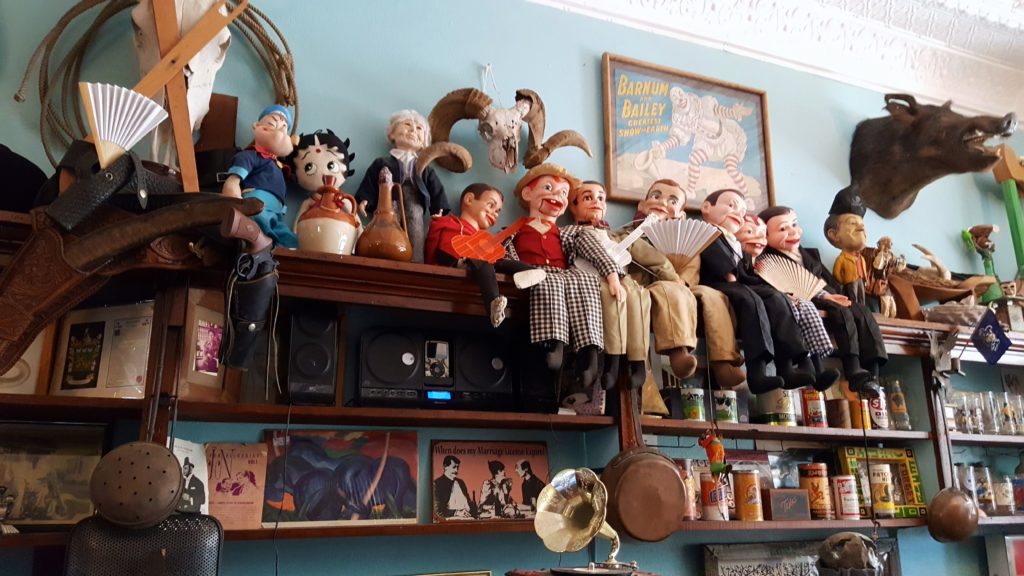
“Greensboro gives artists and musicians a place to escape and unblock the creativity of their minds,” he says. “In Greensboro, there is a real sense of community. The artists and musicians teach each other and are really generous with their craft.”
For example, Hall learned a lot about doing inlay work from local resident Wyatt Fawley, a sought-after banjo maker.
“How do you enhance the quality of life in your community? That is really the question every artist asks,” adds McManus. “All art is looking for the right palate and figuring out what to do with it. Right now, my palate is fixing up these buildings and bringing positive energy through art and music to my community.”
It’s working. On a recent afternoon, Dan Levenson, an award-winning player of old time music from Pittsburgh, stopped by for a quick impromptu banjo and fiddle concert. A regional sculptor was commissioned to create a visual homage to Greensboro’s past at the town’s entrance. The annual “Art Blast on the Mon” — going into its second decade– is scheduled for September 3 and 4, 2016. Sponsored by Nathanael Greene Community Development Corporation, the two-day festival features art in all mediums, alongside musical entertainment and food.
Pablo Picasso said that art washes away from the soul the dust of everyday life. As artists and musicians come to Greensboro, a town built on craftsmanship, they are renewing Greensboro’s soul and washing dust from the heart of the town.
WENDY DUCHENE is an attorney with offices in Allegheny and Somerset Counties. She is also an avid user of the many hiking and biking trails in western PA, where she can often be found on her recumbent bike or walking her dog Sander.
This story was created in partnership with the River Town Program | www.monrivertowns.com

